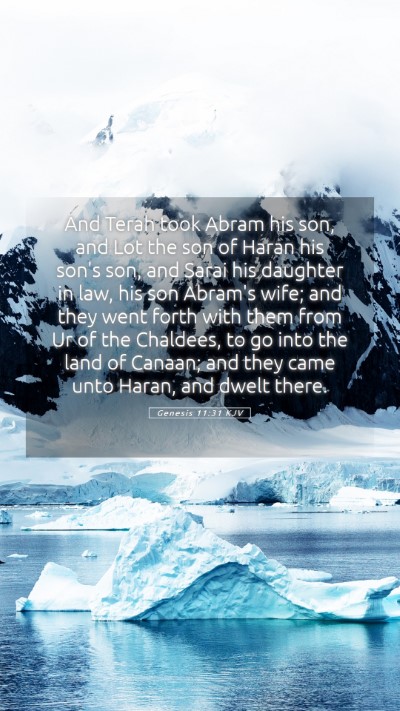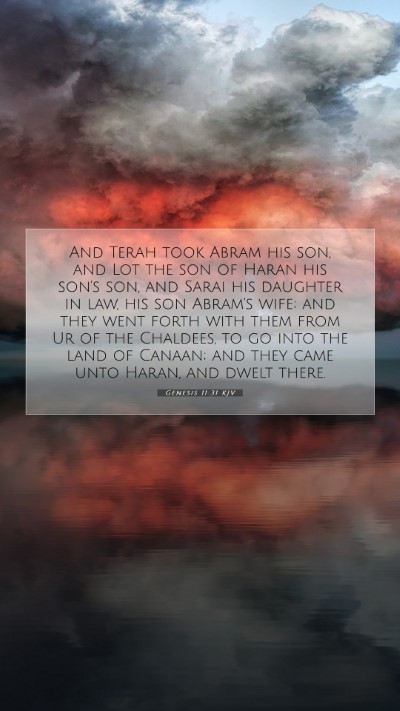Understanding Genesis 11:31
Genesis 11:31 states, "And Terah took his son Abram, and Lot the son of Haran, his son's son, and Sarai his daughter-in-law, his son Abram's wife; and they went forth with them from Ur of the Chaldees, to go into the land of Canaan; and they came unto Haran, and dwelt there."
Bible Verse Meanings
This passage initiates an essential movement in the Biblical narrative. According to Matthew Henry, the verse marks a significant transition. Terah, here a patriarchal figure, leads his family from Ur of the Chaldees, an important cultural and economic center, symbolizing a departure from the familiar towards the unknown. It is a pivotal moment representing obedience and divine calling.
Albert Barnes notes that Ur of the Chaldees was a Babylonian city known for its idolatry, which highlights the significance of Terah's departure as an act of faith away from paganism. Adam Clarke emphasizes the communal aspect by mentioning that the choice to leave is a familial decision, indicating the strong ties that bind families in their quests for spiritual truth.
Bible Verse Interpretations
- Faith and Obedience: The act of departing signifies a leap of faith, suggesting that Terah's family is responding to a divine calling even before Abram receives his own command from God.
- Historical Context: The journey from Ur to Canaan reflects the migratory patterns and the quest for land that many ancient families undertook, suggesting a larger narrative of God’s unfolding plan.
- Identity and Legacy: This verse sets the stage for the emergence of the Israelite nation through Abram, establishing familial and spiritual identity which will resonate throughout the Old Testament.
Bible Verse Understanding
The journey described is not just geographical. It embodies a spiritual and existential quest. Terah, along with his sons and family, is seen as leaving behind everything familiar, suggesting a pursuit for God's promise which is initially revealed to Abram. According to public domain commentaries, this act epitomizes what it means to follow God, often requiring sacrifice and stepping into the unknown. The temporary halt at Haran reflects life’s transitions and the pauses we encounter in faith.
Bible Verse Explanations
Genesis 11:31 serves as a foundational verse explaining the beginnings of God’s covenant people. Matthew Henry suggests it reveals the providence of God in directing family lineage towards fulfilling divine promises.
Adam Clarke offers a detailed breakdown of each character and their role, portraying Terah as a pivotal figure whose actions set the stage for God’s eventual call to Abram. Therefore, understanding this verse involves recognizing the family dynamics, historical background, and the importance of obedience to divine direction.
Cross-References
- Genesis 12:1-3: God's call to Abram to leave towards a promised land.
- Acts 7:2-4: Stephen recounting the call of Abram while noting the context of Terah's journey.
- Hebrews 11:8-10: The faith of Abram in action as he leaves his homeland, referencing the covenant made with him by God.
Conclusion
Genesis 11:31 is not merely a record of a family’s journey; it encapsulates themes of faith, divine guidance, and the unfolding history of God’s chosen people. Through diverse commentary insights, one can discern deeper meanings that apply to modern readers, encouraging reflection on themes of obedience, identity in faith, and the importance of listening to God's call in our lives. This verse provides a backdrop for further Bible study insights and invites a richer exploration of scripture, making it vital for individuals seeking to understand the complexities of biblical narratives and their implications in daily life.


